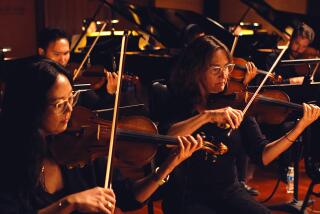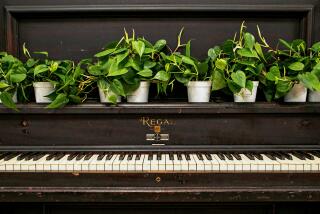A Passion for Tickling Ivories Rooted in Faith
- Share via
SALT LAKE CITY — In a state where taking piano is as much a part of growing up as riding a bike, the Brown family has struck a bold new chord.
The four oldest Brown children study piano at New York’s highly competitive Juilliard School of Music. The youngest, 16-year-old Ryan, practices 25 hours a week at the family home in rural Alpine, hops a Friday-night red-eye to New York for pre-college classes at Juilliard, and then shuttles back to Utah in time for church on Sunday.
For the record:
12:00 a.m. April 18, 2002 FOR THE RECORD
Los Angeles Times Thursday April 18, 2002 Home Edition Main News Part A Page 2 A2 Desk 1 inches; 17 words Type of Material: Correction
Pianos--In a story Sunday in Section A about the piano culture in Utah, the name of composer Mendelssohn was misspelled.
While the Brown epic is the stuff of headlines and guest spots on “Oprah,” it underscores a more widespread point of local pride: When it comes to piano, other states are playing “Chopsticks” while Utah is performing Rachmaninoff. For reasons rooted in Mormon culture, residents have turned Utah into a piano peddler paradise.
Daynes Music, the state’s oldest retail business, sold its first piano in 1862, just 15 years after Brigham Young’s band of pioneers set foot in the Salt Lake Valley. While it’s not much bigger than Oxnard, Salt Lake City hosts the renowned Gina Bachauer International Piano Competition, which this year drew 520 applicants from 40 countries. State officials even brag about Utah’s top standing in a statistical category so obscure that other states somehow fail to mention it: Pianos per capita.
Trade organizations like the Dallas-based Piano Manufacturers Assn. International back up the boast. According to the group, some 1,800 new pianos were sold in the Salt Lake City area in 2000--second only to 1,900 in Chicago, a metropolitan region with four times the population of all of Utah.
Utahans buy pianos at roughly five times the national rate, according to Bob Jones, vice president and general manager of Samick Music, one of the world’s largest piano manufacturers.
“It’s a blueprint for what we wish every market in America would look like,” he said.
Piano Gallery, one of the area’s largest dealers, offers private teachers use of a free 200-seat recital hall for student performances. “It’s booked up for a year and a half,” general manager Joe Toscano said.
At programs in schools, Brigham Young University music professor Paul Pollei breaks the ice by asking the children who have taken piano lessons to raise their hands.
“It’s unbelievable--all of them go up!” said Pollei, who directs the Bachauer competition. “We have a saying here: You can’t be born in Utah unless you play the piano.”
Historians trace Utah’s zeal for music to its Mormon roots. Joseph Smith, the religion’s founder, established a singing school when the Mormons were a persecuted sect in Nauvoo, Ill. Mormon pioneers from Europe brought their music with them; chroniclers of their trek across the Plains write of hearing the strains of Mendelsohn wafting from Mormon camps.
Brigham Young required every group setting out for new territory from Salt Lake to include a fiddler or a singer, said Jerold Ottley, a retired conductor of the Mormon Tabernacle Choir.
“It was important that the people have music,” Ottley said. “It was one of the great salves.”
In Mormon congregations, unpaid members lead worship services and provide the music.
“That makes parents want to prepare the children to take over these responsibilities,” Ottley said. “It’s one of the great impetuses to having a piano.”
Like many other Mormon parents, Keith and Lisa Brown view music as a vital part of family life, and gave their children instruction with hopes that they would play at church.
“There’s so much music in the church, from the Tabernacle Choir on down,” said Keith Brown, a financial officer for a law firm. “You play for funerals, for weddings, for church services. You play just to help out.”
Home-schooled, all the Brown children started piano at age 3. As they grew, they practiced as long as seven hours daily, studying first with their mother, who has a degree in voice, and then with university-level piano teachers.
A few years ago, the two oldest girls--Desirae, now 23, and Deondra, 22--were accepted at Juilliard, which takes only about 1 in 10 of the aspiring musicians who apply. The next year, Gregory, 19, and Melody, 18, had successful auditions, and Ryan was accepted for the pre-college program. He plans to apply to the college program next year. Meanwhile, he continues his weekly treks to Manhattan.
To keep the family together, Keith and Lisa Brown left Alpine, 35 miles south of Salt Lake, in 1998 and rented a house in suburban Hartsdale, N.Y.
“I was looking for anything that would fit five pianos and seven people, that was close to a train station, that was within an hour’s commute of the city, and that wouldn’t break the bank,” he said.
Even with financial aid, the dizzying costs forced the couple and their youngest son back to Utah last year. But Keith Brown insists that the sacrifices have been worthwhile, despite the odds against his children making a living as concert performers.
“What parents wouldn’t bankrupt themselves to have all their kids doing what they love and progressing in one of the world’s top schools?” he asked.
Like their father, the Brown children make their family’s saga sound almost natural.
“It’s kind of like you’ve been doing it so long it just becomes part of you,” said Deondra Brown, taking a break from Brahms’ “Variations on a Theme of Haydn.” “Most people might think we’re kind of odd or that we were pushed by our parents but when they get to know us, that’s just blown out of the water. We’re just happy people; it’s in our genes.”
Deondra and her sister Desirae study together, playing pieces for four hands. If performing doesn’t work out, they figure they can fall back on their Juilliard master’s degrees to pick up teaching jobs.
Three other Utah students are among the 113 studying piano at Juilliard--all the more impressive, school officials say, since nearly half the students come from abroad.
Back in Utah, the piano is often a centerpiece for Mormon “family home evenings,” weekly nights of old-fashioned togetherness.
“We usually open ours with a prayer and a song,” said high school student Grant Anderson. “Sometimes we’ll play games or bake cookies, but we’ll almost always sing around the piano.”
When the Brown kids are home, the house in Alpine booms with laughter, classical chords and the bemused observations of a father who still can’t quite believe his ears.
“We didn’t plan this,” Keith Brown said of his musical clan. “We thought that one, maybe two would stick with it.”
More to Read
The biggest entertainment stories
Get our big stories about Hollywood, film, television, music, arts, culture and more right in your inbox as soon as they publish.
You may occasionally receive promotional content from the Los Angeles Times.











